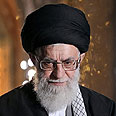
Khamenei's dilemma
Analysis: Iran's supreme leader prefers Jalili, but may be forced to back presidential candidate with strong ties to Revolutionary Guard
The citizens of Iran will elect on Friday their seventh president – the third to serve under Ayatollah Ali Khamenei. Khameni owes his job to Rafsanjani, who selected him to serve as supreme leader despite the fact that he was considered politically and religiously weak.
Rafsanjani kept the presidential post for himself, with the intent of concentrating all the powers in his office. But Khamenei had other plans: He joined forces with the Islamic Revolutionary Guard Corps, and in June 1999 began to banish the Rafsanjani and Khatami camp from its centers of power, while exploiting the student riots.
President Ahmadinejad's election, which was supported by the Revolutionary Guard, was supposed to signal the end of the reformist era. But Ahmadinejad also proved that he wasn't merely a "yes man" and began transferring powers to his own office. Khamenei did not appreciate this, and knew how to humiliate Ahmadinejad in public.
No one in Iran has any doubt that the winner of the elections will be determined by Khamenei – based on his interests and irrespective of the people's vote – but the supreme leader has learned his lesson and is not ignoring the fact that currently there are other elements which must be taken into account. This time he will not allow the elected president to take any authority away from him or challenge him.
Proof of his determination could be seen in the previous presidential election, which was blatantly rigged in Ahmadinejad's favor.
On the other hand, Khamenei also understands that he will not be able to continue ruling Iran without the support of the Revolutionary Guard, so the main dilemma he is facing is whether to support a candidate who has no centers of power and will be loyal to him - or support a candidate with strong ties to the Revolutionary Guard, in order to placate the elite military unit.
Of the six candidates who remain in the race, it appears that Khamenei prefers Jalili because, as opposed to the others, he does not have a camp behind him.
However, it is possible that due to the growing strength of the Revolutionary Guard – in politics and in the Iranian economy – and in light of Khamenei's increased dependency on this body – he may have to support Tehran Mayor Ghalibaf, a former Revolutionary Guard commander and the elite unit's preferred presidential candidate.
Soli Shahvar is the head of the Ezri Center for Iranian and Persian Gulf Studies at Haifa University










